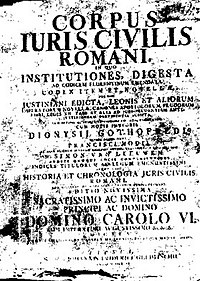 Global Information
Global InformationCorpus Juris Civilis information
This article has multiple issues. Please help improve it or discuss these issues on the talk page. (Learn how and when to remove these template messages)
|
| Body of Civil Law Corpus Juris Civilis | |
|---|---|
 Corpus Iuris Civilis, 1583 | |
| Petrus Sabbatius Iustinianus Augustus, Roman emperor | |
| Territorial extent | Eastern Roman Empire |
| Enacted by | Petrus Sabbatius Iustinianus Augustus, Roman emperor |
| Effective | 534 |
| Introduced by | John the Cappadocian, Tribonian |
The Corpus Juris (or Iuris) Civilis ("Body of Civil Law") is the modern name[1] for a collection of fundamental works in jurisprudence, enacted from 529 to 534 by order of Byzantine Emperor Justinian I. It is also sometimes referred to metonymically after one of its parts, the Code of Justinian.
The work as planned had three parts: the Code (Codex) is a compilation, by selection and extraction, of imperial enactments to date; the Digest or Pandects (the Latin title contains both Digesta and Pandectae) is an encyclopedia composed of mostly brief extracts from the writings of Roman jurists; and the Institutes (Institutiones) is a student textbook, mainly introducing the Code, although it has important conceptual elements that are less developed in the Code or the Digest.[2] All three parts, even the textbook, were given force of law. They were intended to be, together, the sole source of law; reference to any other source, including the original texts from which the Code and the Digest had been taken, was forbidden. Nonetheless, Justinian found himself having to enact further laws; today these are counted as a fourth part of the Corpus, the Novellae Constitutiones (Novels, literally New Laws).
The work was directed by Tribonian, an official in Justinian's court in Constantinople. His team was authorized to edit what they included. How far they made amendments is not recorded and, in the main, cannot be known because most of the originals have not survived. The text was composed and distributed almost entirely in Latin, which was still the official language of the government of the Eastern Roman Empire in 529–534, whereas the prevalent language of merchants, farmers, seamen, and other citizens was Greek. By the early 7th century, Greek had largely replaced Latin as the dominant language of the empire.
The Corpus Juris Civilis was revised into Greek, when that became the predominant language of the Eastern Roman Empire, and continued to form the basis of the empire's laws, the Basilika (Greek: τὰ βασιλικά, 'imperial laws'), through the 15th century. The Basilika in turn served as the basis for local legal codes in the Balkans during the following Ottoman period and later formed the basis of the legal code of Modern Greece. In Western Europe, the Corpus Juris Civilis, or its successor texts like the Basilika, did not get well established originally and was only recovered in the Middle Ages, being "received" or imitated as private law. Its public law content was quarried for arguments by both secular and ecclesiastical authorities. This recovered Roman law, in turn, became the foundation of law in all civil law jurisdictions. The provisions of the Corpus Juris Civilis also influenced the canon law of the Catholic Church: it was said that ecclesia vivit lege romana – the church lives by Roman law.[3] Its influence on common law legal systems has been much smaller, although some basic concepts from the Corpus have survived through Norman law – such as the contrast, especially in the Institutes, between "law" (statute) and custom. The Corpus continues to have a major influence on public international law. Its four parts thus constitute the foundation documents of the Western legal tradition.
- ^ The name "Corpus Juris Civilis" occurs for the first time in 1583 as the title of a complete edition of the Justinianic code by Dionysius Godofredus. (Kunkel, W. An Introduction to Roman Legal and Constitutional History. Oxford 1966 (translated into English by J.M. Kelly), p. 157, n. 2)
- ^ Department, Reference. "GW Law Library: Library Guides: Roman Law Research: Corpus Juris Civilis". law.gwu.libguides.com. Retrieved 10 February 2022.
- ^ Cf. Lex Ripuaria, tit. 58, c. 1: "Episcopus archidiaconum jubeat, ut ei tabulas secundum legem romanam, qua ecclesia vivit, scribere faciat". ([1])